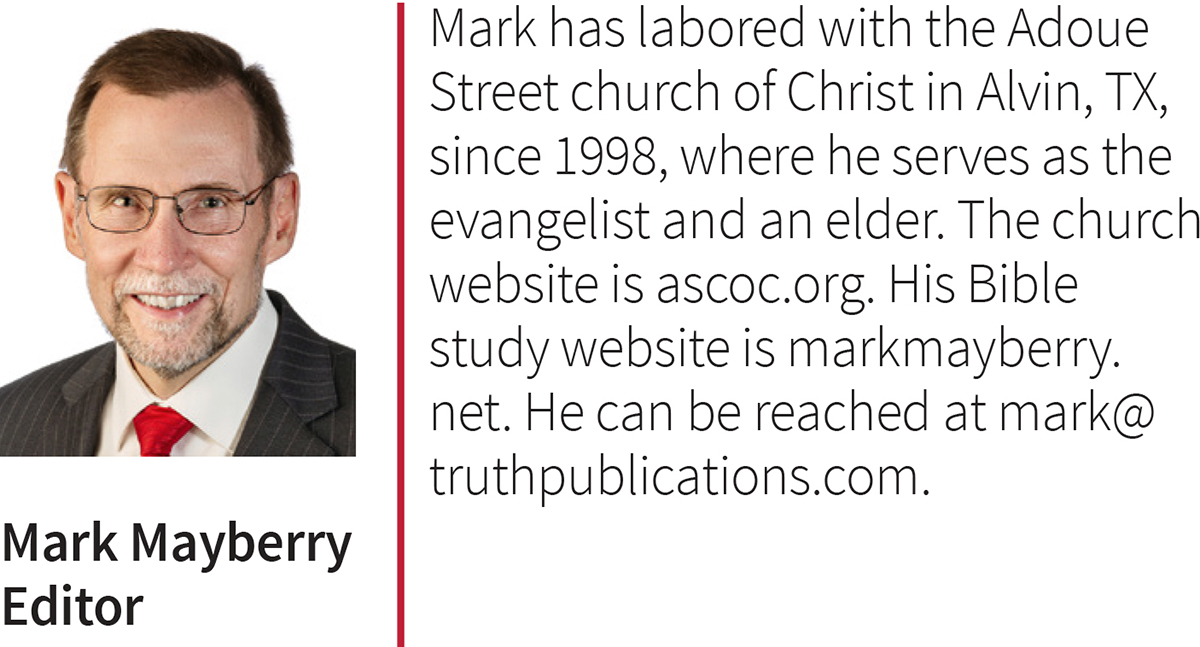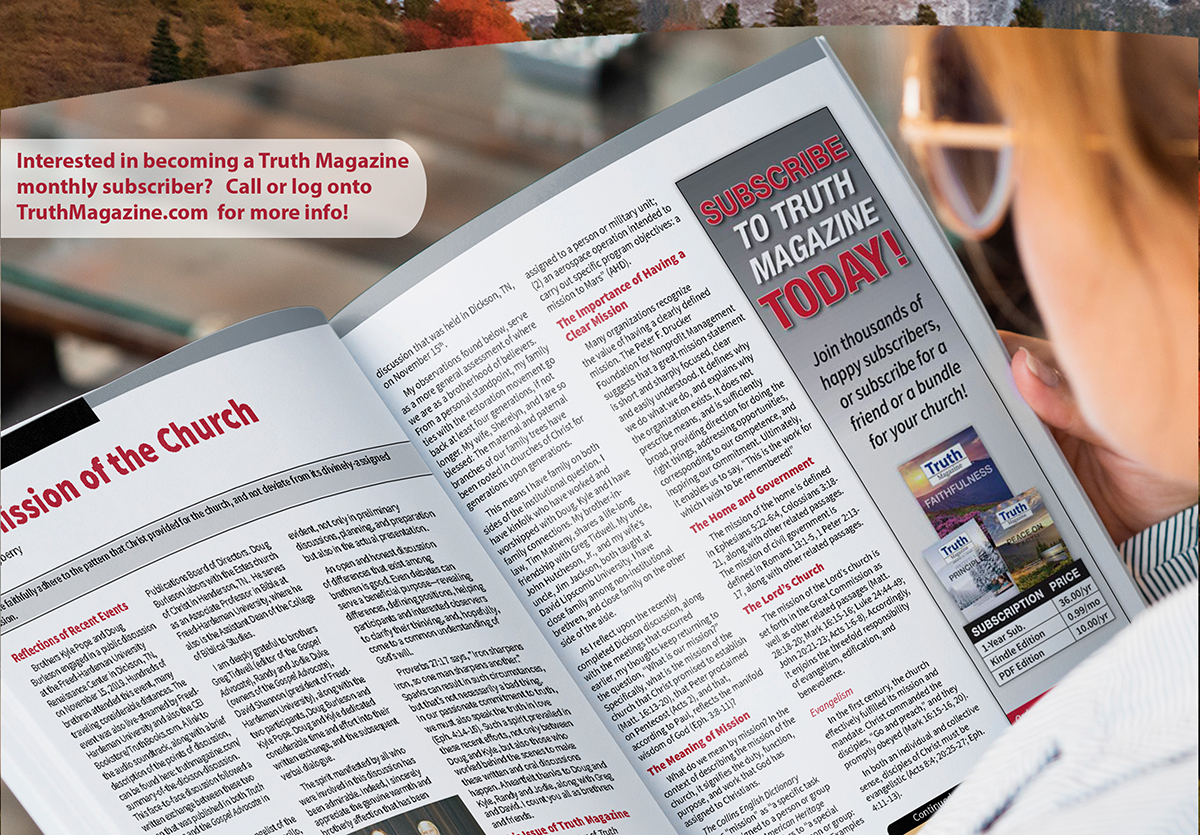
by Mark Mayberry
Synopsis: Kings and commoners, the nations of men, and even God’s people are frequently filled with pride only to be brought low. Contemporary culture shakes its fist in the face of God, but Psalm 2 reminds us that He will have the last laugh.
As I attempt to process the current cultural trends in a biblical context, my mind keeps returning to Psalm 2. This passage provides comfort because it reminds us that there is nothing new under the sun. Christians everywhere should trust in God, even in uncertain times, recognizing that He is in control. Psalm 2 depicts the railings of godless men—kings and commoners alike. Even if it appears that the world is unraveling at the seams, the Lord’s Anointed still reigns.
Even if we come through the current crisis unscathed, even if our freedoms are preserved, and even if we enjoy a renewed period of peace and prosperity, let us never forget that we are soldiers engaged in a spiritual battle. To help brethren deal with these difficult days, the January issue of Truth Magazine focuses on Psalm 2, which reminds us of enduring certainities in uncertain times. My contribution to this collective effort ponders the peril of pride, one of Satan’s primary tools of temptation.
According to the New American Standard Bible’s (NASB) rendition of 2 Chronicles 17:3-6, King Jehoshaphat “took great pride in the ways of the Lord.” The marginal note says, “literally, ‘his heart was high.’” Perhaps the New King James Version (NKJV) helps clarify this concept of pride: “his heart took delight in the ways of the Lord.”
Loving parents delight in their children. In other words, they take pride in their accomplishments, development, and growth. This also involves discipline (Prov. 3:12) and mutual respect (Prov. 23:26).
Yet, the Bible also repeatedly warns against improper pride (Prov. 8:13; 11:2; 16:18; 21:24; 29:23; etc.). Subduing our pride is a constant battle. Although Hezekiah relied upon God and restored Israel’s worship, he foolishly flaunted the temple treasures to visiting dignitaries from Babylon (2 Chron. 32:24-26; cf. 2 Kings 20:12-19).
In Mere Christianity, C. S. Lewis delivers a memorable discourse on the peril of pride:
The vice I am talking of is Pride or Self-Conceit: and the virtue opposite to it, in Christian morals, is called Humility. . . . the essential vice, the utmost evil, is Pride. Unchastity, anger, greed, drunkenness, and all that, are mere fleabites in comparison: it was through Pride that the devil became the devil: Pride leads to every other vice: it is the complete anti-God state of mind (121-122).
In God you come up against something which is in every respect immeasurably superior to yourself. Unless you know God as that—and, therefore, know yourself as nothing in comparison—you do not know God at all. As long as you are proud you cannot know God. A proud man is always looking down on things and people: and, of course, as long as you are looking down, you cannot see something that is above you (124).
Satan tempted Eve through the lust of the flesh, the lust of the eyes, and by appealing to her pride (Gen. 3:1-6). After the fall, God drove Adam and Eve from the garden and stationed cherubim (i.e., exalted angelic beings [Ps. 99:1]) east of the garden of Eden to guard the way to the tree of life (Gen. 3:22-24).
When humanity rebelled against God’s command to be fruitful and multiply and fill the earth, seeking to dwell in a centralized urban setting and build a tower to heaven, God thwarted their prideful plans by confusing their language (Gen. 11:1-9).
Israel’s disobedience was, in part, an expression of pride: “‘I will also break down your pride of power. . .” (Lev. 26:14-20, esp. v. 19). Isaiah employed similar language in denouncing the northern kingdom: “Woe to the proud crown of the drunkards of Ephraim. . .” (Isa. 28:1-3).
Similarly, divine judgment (in the past, present, and future) is poured out upon arrogant humanity: “The Lord of hosts will have a day of reckoning against everyone who is proud and lofty and against everyone who is lifted up, that he may be abased. . .” (Isa. 2:12-17).
OT prophets foreshadowed God’s judgment upon Egypt and her allies (Ezek. 30:6-9, 13-19; 32:11-15) and upon Babylon (Isa. 13:17-22).
Jesus foreshadowed the destruction of Jerusalem, and John anticipated the overthrow of the Roman Empire. Although their relative strength of the Jews and Romans differed dramatically, both were proud, perverse, and persecutors of faithful Christians.
We can avoid the peril of pride by focusing upon our fundamental duty toward God: i.e., fearing, befriending, and loving God.
Transgression, not truth, resonates in the heart of sinners. Why? There is no fear of God in their eyes. Iniquity replaces innocence; wickedness replaces wisdom. Instead of walking in the ways of God, such a man pursues a path of evil (Ps. 36:1-4, esp. v. 1). Paul’s graphic depiction of human depravity concludes with a quotation of this selfsame passage (Rom. 3:9-18, esp. v. 18).
Holy and awesome is the name of our God. He redeems His people and reveals His will. His works are truth and justice, and His precepts sure. Let us, therefore, fear the Lord and obey His commandments (Ps. 111:7-10, esp. v. 10).
As Solomon reminds us, the fear of the Lord is the beginning of both knowledge and wisdom (Prov. 1:7; 9:10). Reverently opening the Scriptures, may we absorb and apply its truths and acquire understanding and wisdom.
Families can become estranged from one another, as did Laban and Jacob, as also the brothers of Joseph (Gen. 31:1-6, esp. vv. 2 & 5; 37:1-4, esp. v. 4). What causes such alienation? Selfishness and sinful attitudes impact our earthly and heavenly relationships (Jas. 4:4-10, esp. v. 4).
In both the Old and New Testaments, Abraham is called a friend of God (2 Chron. 20:5-7; Isa. 41:8-10; Jas. 2:21-23). Genesis records God’s call of Abraham and the threefold covenant He made with the patriarch. Abram/Abraham was obedient to God’s commandments, living and walking by faith (Heb. 11:8-12, 17-19). Like the patriarch of old, we should strive to be friends of God (John 15:12-17).
In John 5, Jesus healed a lame man who had been sick for thirty-eight years. Instead of rejoicing, the Jews were seeking to kill Him (John 5:18). Rebuking their unbelief, Jesus focused upon their root problem: “I know you, that you do not have the love of God in yourselves” (John 5:39-42, esp. v. 42).
Like Israel of old, we must love the Lord with all our heart, soul, mind, and strength (Deut. 6:4-9; 2 Thess. 3:5; Jude 20-21). Each disciple should ask, “Do I fear God? Am I a friend of God? Do I love God, and is this reflected in my conduct?” (John 14:15).
We have considered historical examples of pride, as manifested in the garden of Eden, at the tower of Babel, by Israelites, and the nations of men. However, before closing, please consider a more personal application: What about our country? What about our congregation? What about our family? What about me?
The Progressive Movement is the ultimate expression of human pride. Its proponents shout, “We are right. You are wrong. We know better! You know nothing. We are virtuous. You are evil. Moreover, if you refuse to eagerly and immediately comply with our ever-changing, whimsical demands, you will be (1) silenced and (2) subjected to forced reeducation.”
All of this makes me wonder if the bottomless pit of Revelation 20 has been opened, and the demons are pouring forth. . . . Of course, we don’t know when the end will come, but we need to be prepared and be willing to stand, even (especially) when the camp of the saints seems surrounded, the enemy presses on every side, and it appears that hope is lost. 
Lewis, C. S. Mere Christianity. New York: HarperOne, 2001.


